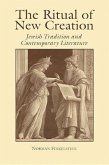This book provides the first publication of the tract "Tiferet Bachurim" (The Glory of Youth) which was written in the mid-seventeenth century by R. Pinhas Barukh ben Pelatiyah Monselic in Ferrara, Italy. The tract was written as a guide for young men about to marry regarding their family life and their sexual deportment. By analyzing the "Tiferet Bachurim" Roni Weinstein addresses the following questions: What was the source of the growing interest in sexuality, and controlling juvenile sexuality? How is this tract related to centuries old Jewish ethical literature, as well as literature in contemporary Catholic Italy? Is the "Tiferet Bachurim" part of the religious and cultural fermentation of the Counter-reformation? Finally, in what way does Jewish mysticism and pietism of Kabbalah tradition play a central role in the composition of this tract.
Hinweis: Dieser Artikel kann nur an eine deutsche Lieferadresse ausgeliefert werden.
Hinweis: Dieser Artikel kann nur an eine deutsche Lieferadresse ausgeliefert werden.








